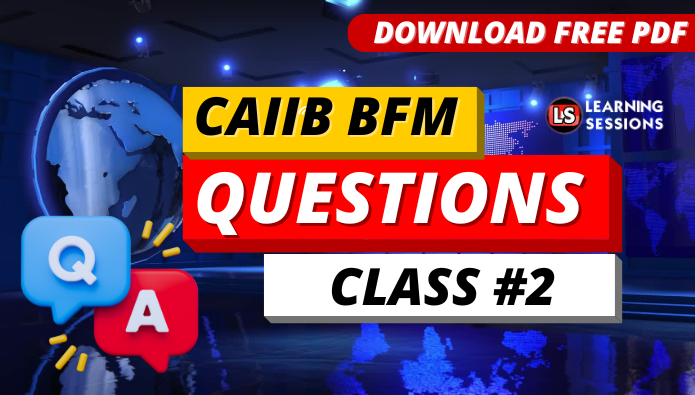In this engaging session, we bring you 20 high-value Previous Year Questions (PYQs) from Module A of CAIIB BFM, broken down with logic, examples, and smart exam strategies. From UCPDC 600, TT Rate, LRS rules, to NSFR, EXIM Bank, and ECGC Credit Insurance, every important topic is explained in a bilingual Hindi-English mix that makes learning super easy.
📚 CAIIB Study Resources 📚
👉 Check Here
👉 Check Here
👉 Check Here
👉 Get Tests Here
👉 Check Here
👉 Click Here
👉 Click Here
🎯 Don’t forget to like, share, and tag your banker friends!
🎥 Watch the Full Session First
📚 Video Breakdown: BFM Module A – Question Wise Timestamps & Concepts
⏱️ 00:01 – UCPDC 600: Article for Compliance Days
When dealing with Letters of Credit (LC), timing is everything. According to UCPDC 600, Article 14 mandates that the issuing, nominated, or confirming bank has maximum five banking days to check whether presented documents are in compliance with the LC terms.
🧠 Example: If a seller submits a complying presentation on Monday, the bank has until Friday (assuming no holidays) to complete document scrutiny.
⏱️ 05:00 – TT Rate & Delayed Settlements
TT Rate stands for Telegraphic Transfer rate – used when immediate settlement is expected. Here are the key takeaways:
- Delayed foreign currency interbank transactions >15 days → incur 2% interest above the currency’s benchmark.
- Delayed INR settlements → 2% interest above FBIL MIBOR.
- Important: TT selling rate is not always used for all cancellations.
💬 Think of TT like a wire transfer – it’s fast and often used when time-sensitive payment matters.
⏱️ 10:00 – What is a Nostro Account?
A Nostro account is a record held by an Indian bank in a foreign bank, denominated in foreign currency. This account is used for foreign exchange and international trade settlements.
📘 Memory Trick: “Nostro” = “Our money in your bank.”
✅ Example: SBI maintains a USD account with JPMorgan – SBI’s records will show it as a Nostro account.
⏱️ 14:25 – LRS Documentation for Remittances up to USD 25,000
Under the Liberalised Remittance Scheme (LRS), simplified documentation applies up to $25,000:
- PAN Card
- Declaration of Source of Funds
No need for bulky paperwork or booking proofs. 📝
🔥 Update: For education remittances, TCS is NIL up to ₹10 lakhs.
⏱️ 19:00 – Single Master Form (SMF) Explained
The SMF was introduced on FIRMS portal to streamline foreign investment reporting. It consolidates:
- ARF – Advance Remittance Form
- FCGPR – Allotment reporting
- FCTRS – Transfer of shares
✅ All updates between 28 June–July 2018 were accepted. From Sept 1, consolidated format is live.
⏱️ 22:00 – IFSC Units: Tax & Compliance Benefits
Special Economic Zones (SEZs) under IFSC enjoy:
- 💸 10-year exemption on offshore income
- ❌ No requirement to maintain SLR
- ❌ Not liable to pay GST on cross-border fees
⏱️ 24:00 – NSFR vs. LCR (Basel III)
NSFR (Net Stable Funding Ratio) ensures long-term liquidity of banks (1 year horizon).
LCR (Liquidity Coverage Ratio) ensures short-term liquidity (30 days).
❌ NSFR does not exclude retail deposits; in fact, retail deposits are treated as stable!
⏱️ 26:00 – EXIM Bank: Supplier’s Credit
Supplier’s Credit enables Indian exporters to offer deferred payment terms to foreign buyers, while receiving upfront financing from EXIM Bank.
📘 Real-life example: An Indian machinery exporter sells to an African importer on 6-month deferred terms. EXIM pays upfront to the exporter.
⏱️ 29:00 – Exchange Control Copy Submission
If an importer brings goods worth >$1,00,000, they must submit Exchange Control Copy of Bill of Entry to AD bank within 3 months from remittance.
⏱️ 32:00 – ECGC Credit Limits: Revolving Category
ECGC approves revolving limits annually for countries with stable risk profiles.
⚠️ Not for high-risk or unsettled overdue countries – those are approved on case-to-case basis under Category II.
✅ Key Takeaways & Final Words
🎉 This session wasn’t just about MCQs – it was about building clarity, boosting confidence, and making BFM scoring easier.
By breaking down each question from UCPDC to NSFR, you’ve now gained both factual and conceptual clarity needed for CAIIB success.
🎯 Whether it’s the 5-day rule for document compliance, tax benefits of IFSCs, or the logic behind ECGC classifications – now you know the why behind each answer.
🔥 Your Action Plan:
- 🎯 Comment your score below
- 💬 Ask questions and share your thoughts
- 🔔 Subscribe and explore related CAIIB prep videos
- 📲 Share with colleagues to help them grow
📥 Download the Free PDF
✅ Includes answers, explanations, examples & memory tricks
Also Like:





